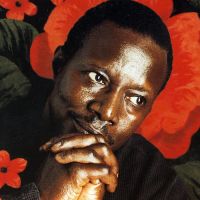| |
|
  Veteran from Malian great band in the 1970~80's (like Zoumana Diarra),
the « Super Biton of Segou », favourite partner of Kasse Mady Diabate,
Mama Sissoko is such a great guitarist and singer. Veteran from Malian great band in the 1970~80's (like Zoumana Diarra),
the « Super Biton of Segou », favourite partner of Kasse Mady Diabate,
Mama Sissoko is such a great guitarist and singer.
 On my own part, I like his lyricism, his masterful guitar work and and his deep and dark vocals for his music,
enhanced by his great experience, give us a really expressive and modern message . On my own part, I like his lyricism, his masterful guitar work and and his deep and dark vocals for his music,
enhanced by his great experience, give us a really expressive and modern message .
 « Despite its intensely percussive nature, this second solo release by Malian guitarist and Super Biton de Segou veteran
Mama Sissoko is a guitar and vocal recording. And despite the use of electric guitars, lots of electric guitars, an earthy atmosphere is retained throughout. Production surmounts the challenge of so
much happening at once, separating and layering without compromising the interwoven unity of the sound. And, though they might suffer from comparison to Baaba Maal's for example, Sissoko's vocals,
deep, dark, and resonant, are compelling in their own fashion. « Despite its intensely percussive nature, this second solo release by Malian guitarist and Super Biton de Segou veteran
Mama Sissoko is a guitar and vocal recording. And despite the use of electric guitars, lots of electric guitars, an earthy atmosphere is retained throughout. Production surmounts the challenge of so
much happening at once, separating and layering without compromising the interwoven unity of the sound. And, though they might suffer from comparison to Baaba Maal's for example, Sissoko's vocals,
deep, dark, and resonant, are compelling in their own fashion.
 Soleil de Minuit starts with « Jarabi Muso », a quick shuffle enlivened by the busy
percussive backing of multiple guitars; short, repeated staccato phrases offer a caffeinated musical substrate for Sissoko's deep, strong vocal. His guitar solos and ornamentations ring in that
plunky sound emanating from the center pickup of an electric guitar and seem regally restrained in their refusal to sacrifice melodic coherence for flash. A more traditional Malian rhythm, featuring
a dense thicket of guitar and bass figures over a swinging beat, emerges in « Boma Ma. » The vocal refrain is comparatively simple, but the harmonies between Sissoko and Toussainte Siané enchant and
anchor the more improvisational verses. Soleil de Minuit starts with « Jarabi Muso », a quick shuffle enlivened by the busy
percussive backing of multiple guitars; short, repeated staccato phrases offer a caffeinated musical substrate for Sissoko's deep, strong vocal. His guitar solos and ornamentations ring in that
plunky sound emanating from the center pickup of an electric guitar and seem regally restrained in their refusal to sacrifice melodic coherence for flash. A more traditional Malian rhythm, featuring
a dense thicket of guitar and bass figures over a swinging beat, emerges in « Boma Ma. » The vocal refrain is comparatively simple, but the harmonies between Sissoko and Toussainte Siané enchant and
anchor the more improvisational verses.
 « Safiatou » brings a startling rhythmic change, an unsyncopated common-time cumbia presided over by a calm snare
rim-tap, a fine platform for Sissoko's guitar, restrained, tasteful, and retentive of long, coherent melodic figures in which precise timing trumps speed. The title track is a bouncy Cuban-style
salsa, distinguished by Sissoko's and Siané's vocals, its rapidly picked guitar background seeming to regress into infinite sonic depths, its movement amplified by Richard Haas' inventively
peripatetic bass, featured on the break. Other high-points include Manssana Cisse, its simple two-chord background incrementally constructed
from tightly coordinated guitar and bass figures around polyrhythmic triplets infiltrating common time, static and dynamic at once, and Fissiri
Wale«Fissiri Wale» is a famous Manding folksong ; it means : the miserable («fissiri») ungrateful man («wale»)... Read more., a slow lope featuring especially tight bass-guitar
interaction prefiguring a vocal refrain delivered in two-part harmony. « Safiatou » brings a startling rhythmic change, an unsyncopated common-time cumbia presided over by a calm snare
rim-tap, a fine platform for Sissoko's guitar, restrained, tasteful, and retentive of long, coherent melodic figures in which precise timing trumps speed. The title track is a bouncy Cuban-style
salsa, distinguished by Sissoko's and Siané's vocals, its rapidly picked guitar background seeming to regress into infinite sonic depths, its movement amplified by Richard Haas' inventively
peripatetic bass, featured on the break. Other high-points include Manssana Cisse, its simple two-chord background incrementally constructed
from tightly coordinated guitar and bass figures around polyrhythmic triplets infiltrating common time, static and dynamic at once, and Fissiri
Wale«Fissiri Wale» is a famous Manding folksong ; it means : the miserable («fissiri») ungrateful man («wale»)... Read more., a slow lope featuring especially tight bass-guitar
interaction prefiguring a vocal refrain delivered in two-part harmony.
Tradition or pop ? With a recording as engaging, intricate, and pleasing as Soleil de Minuit, the distinction loses cogency ; listen to Mama Sissoko create
tomorrow's tradition today. » - Jim Foley.
|